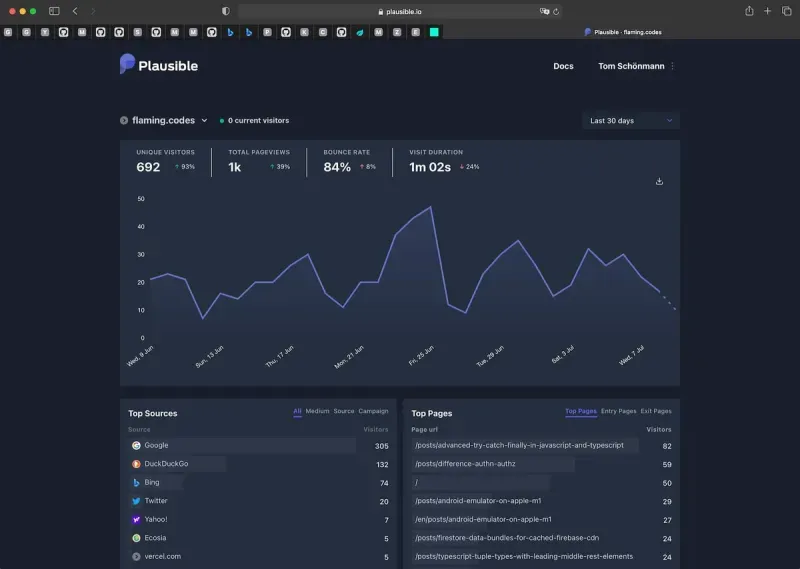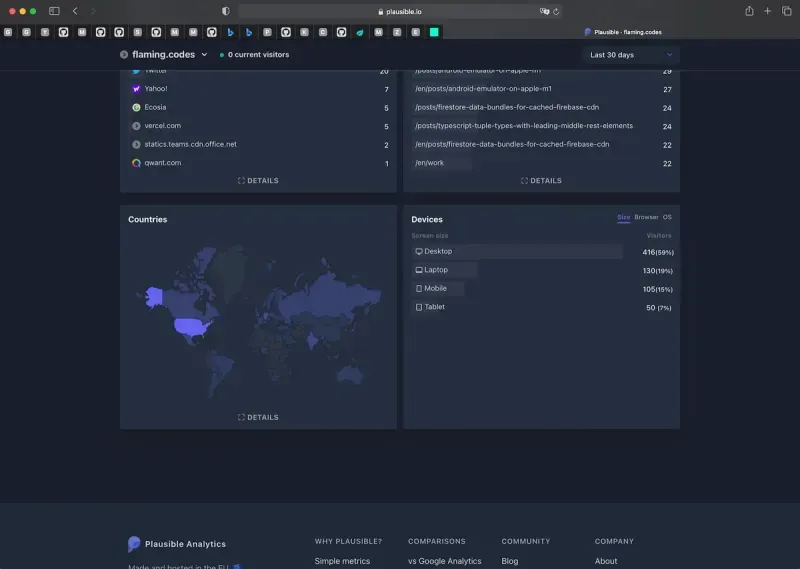SEO without Google Analytics?
When starting this progressive web app, I asked myself if it’s possible to deliver a high SEO-performance without using Google Analytics. To be more precise, I didn’t want to use any of the common analytics tools, as my focus was a privacy-first site that respects its users.
The question “is SEO without Google Analytics possible” can be answered by evaluating the following aspects.
How high are the pages ranked in search engines, for example in Google, Bing or DuckDuckGo?
How precise can past content be analyzed regarding various performance metrics, such as bounce-rate, time spent per page, etc
So, is it possible to meet these criteria? Yes, it is. Read on to see how I accomplished it.
What analytics to choose
One of the most interesting questions I asked myself was if it’s possible to both reach a high search engine rank as well as if I could understand user behavior with Google Analytics. Regarding the ranking, I wanted to explore if Google actually applies a penalty if insights from Google Analytics are missing. But more on that later.
Regarding a privacy-first analytics service, I decided to go with “Plausible.io”, which offers a solution that doesn’t spy on the users visiting my web app. In fact it’s so restrained regarding data collection that I don’t even have to show a consent banner regarding the usage of personal information. With Plausible.io, I simply don’t collect any personal identifiable data.
You may wonder if the collected data then is even enough to make good decisions based on user behavior. In my experience, it totally is sufficient for an analysis of trends and growth.


High rank in Google without Google Analytics
What is more important is the question if I can actually achieve high placements in search engines, for instance on Google or Bing. This depends on a number of factors, primarily the optimal usage of structured metadata, a clean and fast HTML site, a fast hosting provider preferably serving your content from a CDN and of course good and relevant content itself.
If your site checks all those boxes, chances are high you’ll get a high ranking score and therefore be listed in the top spots for search results - even without using Google Analytics.
Endurance required
Note that if you’re just starting with your own web app and want to reach a high rank, you’ll most likely won’t perform well for quite a while. Taking Google as an example, the ranking algorithm clearly has a timeframe for new sites until it actually starts improving the score. This may be a mechanism to see if a site is trustworthy over a given time span. Only if your web app seems legitimate will search engines start increasing your ranking score.
Personal examples from this site
To show you that the setup described in this article can actually work, here are a few keywords you can search for in Google or Bing where my posts are highly ranked (at least the last time I checked).
- firestore data bundles
- android performance class
- devtools command menu
- typescript zx
- typescript pipeline operator
- kickscale scheduler
- androidenv
Especially on Bing, many of my articles describing features of Typescript are very high ranked.
- typescript tuple types
- typescript template string types
- typescript pipeline operator
Closing words
To summarize, yes, in my experience it’s possible to not use Google Analytics and still reach a good SEO performance. Google doesn’t seem to give a penalty for not having all the insights in your site when you’re not using their analytics service.
What’s more important is a good data structure as well as fast loading performance. If you already have an audience on Twitter, for example, the start of your site will be easier as backlinks to your site will be shared. But even if you don’t have any follower, a high rank on search results can still be achieved - as I can proof with this progressive web app.